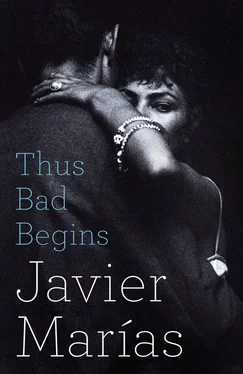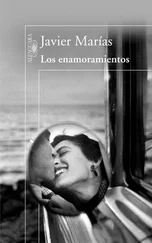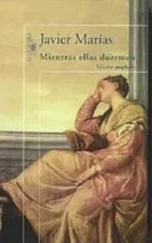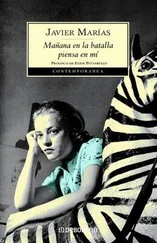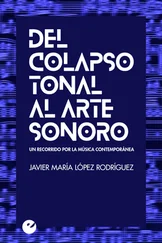I don’t want to ask for it, but the images blur together and that’s what I end up doing. And when this happens, I can’t help feeling that Susana notices that something odd is going on, can sense the incongruousness of what’s happening in my mind, or in that uncontrollable thing — the mind’s eye. She pauses for a few seconds, observes me with one half-open eye, and waits for the malaise to pass. And I sometimes wonder if she hasn’t always known exactly what happened, if the barefoot steps I heard in the corridor were, in fact, hers and whether her cheeks burned with a daughter’s indignation or with the childish jealousy of the young girl in love or with a combination of both those things, if those were her footsteps. She has never mentioned it, however, and I certainly haven’t; some secrets are best left secret. That’s also why I’ve never told her what I found out about her mother when I followed her nor what Muriel told me later on. What would be the point? She witnessed the results and her father’s wounding, punishing behaviour, and I don’t think she wants to delve into what happened in the lost past, before she was even born. However, I’m always afraid that one day, in a fit of anger, she’ll reveal what she knows and reproach me for what I did that night, that she’ll throw it in my face and say: ‘How could you?’ Or that I might angrily reveal my secret, as Beatriz did with Muriel, showing him the letter she denied having received and thus, after long years of careful concealment and deceit, unleashing her own misfortune. The two situations can’t really be compared, and it wouldn’t necessarily be a misfortune if we managed to laugh about it, anything is possible, and I’m not Muriel and Susana isn’t her mother, although, like Beatriz, she takes a light-hearted view of her own actions and those of other people and often considers things to be ridiculous or mere childish nonsense, and rarely gives any importance to what isn’t important at all. I was right to wait to love her, until she chose me with her tremulous finger and I was capable of seeing her; and how right I’ve been to love her during all these years, all these past years. I’ve probably never done anything better.
That’s why I find it so worrying when the image of Beatriz suddenly, and however fleetingly, comes into my mind in the middle of some intimate moment. Then I try to summon up that remote foreshadowing, which disquieted and troubled me at the time, the ephemeral, intrusive vision of an adolescent Susana. Now, on the other hand, I’d like to recover that vision, so that, through the memory of that vision, reality can be restored and that forgotten yesterday can return the today, which, just for an instant, has slipped away from us. It isn’t only Susana who, with one half-open eye, stops to observe me suspiciously, or is it questioningly, curiously? I stop too, become distracted, absent, turn my face away as if I didn’t want to be kissed on the mouth by a ghost who also once turned away her face and denied me her mouth when she was still flesh, brimming, moving flesh. And then there’s a moment when one of us, either Susana or me, I’m not sure, must be thinking: ‘No, no kisses.’ We look at each other without saying anything, and perhaps what we’re saying to ourselves is something on which we both agree: ‘And no, no words.’
Translator’s Acknowledgements
I would like to thank Javier Marías for all his help and generosity, and, as always, Annella McDermott and Ben Sherriff for their unfailing support and advice.
